Challenging beauty standards with inclusivity and acceptance
 CREDIT: CALEIGH REID
CREDIT: CALEIGH REIDAccording to boudoir photographer Aroha McKaig, "Everybody deserves to feel sexy, beautiful, and unique."
Beauty standards shape the projection of society’s values and views in fashion. These rules determine who is viewed, who is honoured, and who is excluded. They have defined and reinvented what is attractive, desirable, and stylish.
However, it is essential to realize that these standards are fluid, they have changed dramatically throughout the years, reflecting shifting attitudes, values, and societal beliefs.
Professional boudoir photographer and founder of The Boudoir Lounge Aroha McKaig has been working to smash the idea that only certain body types are worthy of recognition and value.
“People are just people, and humans are humans. We are all the same and unique,” McKaig said.
She added that she has struggled with “fitting in the beauty and fashion standard.”
“There are so many underrepresented people who do not have the opportunities to be seen because of their size or shape or because of how society has told us that they should look,” said McKaig. “I have been there, and it is not fun or fair.”
She said that she knows what it is like to be bullied for living in a “fat body” that she did not choose.
“Everybody deserves to feel beautiful, sexy and unique,” McKaig said.
Fashion standards have never been relevant for Fanshawe College broadcasting radio and media production program student Michael Doxtator. He said that other people’s opinions about how he dresses or looks have never affected him.
“I do not think I have ever fit in any fashion standards, mostly because I usually wear clothes that I find to be more comfortable rather than looking good,” Doxtator said.
He said he only worries about what he wears on special occasions with a dress code, such as weddings or funerals.
“Everyone is allowed to wear clothing that they are comfortable wearing without worrying about how they look, no matter their body type,” Doxtator said.
Doxtator added that, thankfully, no one has ever made fun of him about his appearance or looks, but he knows of cases in which people have experienced bullying for it.
McKaig said that one of the main reasons she decided to focus on her career in body image photography is because she was a target of bullying growing up.
“Growing up, I was a large child. One of the biggest kids in my school, and because of that, I got fat-shamed,” McKaig said. “I even had issues within my own family because I did not look or dress like other kids.”
McKaig said that she did everything she possibly could to lose weight. She thought that was what would make her fit in.
“I was starving myself and exercising so hard just to lose weight, to feel like I was what society would deem a normal-looking girl in my teenage years,” McKaig said. “Society tells us that if we do not fit the norm, something is not right with us, and we better do something about it.”
Ultimately, she said it did not lead her to anything. The satisfaction and desire to fit in were gone because she was not enjoying her life anymore.
“When I was fat, I received criticism because I was not a healthy-looking girl in their eyes. When I lost weight, I received criticism because I was too skinny,” McKaig said. “People will always talk; just maintain your authenticity with others and be happy with yourself.
She added that as a boudoir photographer, it is her job to ensure a safe space for everyone and help everyone recognize their beauty.
“I could easily make you look sexy and fashionable, but I want it to be your kind of sexy and fashionable,” McKaig said. “We look how we look, it is okay to look that way. There is no normal. There is you, and there is me. That is all.”
She said people struggling need to find a supportive community, get around friends and rally around the people who love them no matter what.
“Talk to a therapist if that is what you need to do. That is what helped me to overcome that stage in my life. There is a lot of support out there,” McKaig said. “The most important thing to acknowledge is that you are not alone and will never be alone.

















